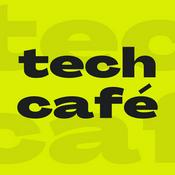380 épisodes
- An airhacks.fm conversation with Holly Cummins (@holly_cummins) about:
first computer experience with her dad's Kaypro CPM machine and ASCII platform games,
learning Basic programming on an IBM PC clone to build a recipe management system,
studying physics at university with a doctorate in quantum computing,
self-teaching Java to create 3D visualizations of error correction on spheres during PhD research,
joining IBM as a self-taught programmer without formal computer science education,
working on Business Event Infrastructure (BDI) at IBM,
brief unhappy experience porting JMS to .net with Linux and VNC,
moving to IBM's JVM performance team working on garbage collection analysis,
creating Health Center visualization tooling for J9 as an alternative to JDK Mission Control,
innovative low-overhead always-on profiling by leveraging JIT compiler's existing method hotness data,
transitioning to WebSphere Liberty team during its early development,
Liberty's architectural advantage of OSGi-based modular core enabling small fast startup while maintaining application compatibility,
working on Apache Aries enterprise OSGi project and writing a book about it,
discussion of OSGi's strengths in protecting internal APIs versus complexity costs for application developers,
the famous OSGi saying about making the impossible possible and the possible hard,
microservices solving modularity problems through network barriers versus class loader barriers,
five years as IBM consultant helping customers adopt cloud-native technologies,
critique of cloud-native terminology becoming meaningless when everything required the native suffix,
detailed analysis of 12-factor app principles and how most were already standard Java practices,
stateless processes as the main paradigm shift from JavaServer Faces session-based applications,
joining Red Hat's quarkus team three and a half years ago through Erin Schnabel's recommendation,
working on Quarkiverse community aspects and ecosystem development,
leading energy efficiency measurements confirming Quarkus's sustainability advantages,
current role as cross-portfolio sustainability architect for Red Hat middleware,
writing Pact contract testing extension for Quarkiverse to understand extension author experience,
re-architecting Quarkus test framework class loading to enable deeper extension integration,
recent work on Dev Services lazy initialization to prevent eager startup of multiple database instances across test profiles,
fixing LGTM Dev Services port configuration bugs for multi-microservice observability setups,
upcoming JPMS integration work by colleague David Lloyd requiring class loader simplification,
the double win of saving money while also reducing environmental impact,
comparison of sustainability benefits to accessibility benefits for power users,
mystery solved about the blue-haired speaker at European Java User Groups years ago
Holly Cummins on twitter: @holly_cummins - An airhacks.fm conversation with Christofer Dutz (christofer-dutz) about:
first computer was a Commodore C64 from Hannover Messe,
early programming in Basic,
playing Wizards of War game on cassette tape,
growing up in Melbourne Australia until age ten,
visiting Ayers Rock and seeing prehistoric armored fish in puddles,
learning C and C++ at Volkshochschule around 1992,
memory management challenges with DOS gaming like X-Wing vs TIE Fighter and Wing Commander,
starting Java at Technical University of Darmstadt in 1998 with version 1.0.7,
appreciating Java's simplicity compared to C++ and no system crashes from memory errors,
early involvement with Apache Cocoon for XML and XSL transformations,
contributing to eXist-db XML database as committer number two,
working with XML XSL and XSLT for data transformation,
frustrations with YAML compared to XML,
transition from Cocoon to Adobe Flex after Cocoon switched to Spring and Maven,
becoming co-maintainer of Flex Mojos Maven plugins,
Adobe donating Flex to Apache Software Foundation,
attending ApacheCon in Sinsheim and connecting with Apache committers,
committer and PMC member of 12 active Apache projects,
firefighting role fixing Maven builds for stuck projects,
retiring Apache Cocoon project,
strong focus on industrial IoT projects,
Apache IoTDB as best time series database,
Apache StreamPipes for cloud IoT orchestration,
Apache Camel and Apache NiFi involvement,
founding Apache PLC4X in 2017 at codecentric,
Apache PLC4X as JDBC-like interface for industrial equipment communication,
spending 80-90 hours per week on PLC4X for nine years,
challenges with industrial automation industry not understanding open source,
anecdote about steel melting plant operator expecting free enterprise support,
Germany being a difficult market for industrial automation consulting,
founding ToddySoft company end of last year,
building installable products and plugins for industrial solutions,
ethical approach to open source by only selling products from projects he contributes to,
real-time definitions varying from tens of milliseconds in cloud to nanoseconds in industrial systems,
ToddySoft named after PLC4X mascot Toddy the palm civet (toddy cat),
plans for future episode discussing IoTDB StreamPipes PLC4X and NiFi use cases
Christofer Dutz on LinkedIn: christofer-dutz - An airhacks.fm conversation with Thomas Wuerthinger (@thomaswue) about:
clarification of GraalVM release cadence changes and decoupling from openJDK releases,
GraalVM focusing on LTS Java releases only (skipping non-LTS like Java 26),
GraalVM as a multi-vendor polyglot project with community edition and third-party vendors like Red Hat BellSoft and microdoc,
increased focus on python support due to AI popularity,
GraalVM team alignment with Oracle Database organization,
Oracle Multilingual Engine (MLE) for running JavaScript and Python in Oracle Database,
MySQL MLE integration,
native image support for stored procedures in Oracle Database,
shipping lambda functions from client applications to database for temporary execution,
treating Oracle Database as an operating system for running business logic,
serverless workloads directly in Oracle Database,
application snapshotting similar to CRaC but running in user space without kernel privileges,
efficient scale-to-zero capabilities with native images,
Oracle REST Data Services service generalization for serverless execution platform,
database triggers for workflow systems and application wake-up,
durable functions with transactional state storage in Oracle Database,
comparison to AS400 architecture with transaction manager database and operating system in same memory,
memory price increases making GraalVM native image more attractive,
lower memory consumption benefits of native image beyond just startup time,
CPU-based inference support with SIMD and Vector API,
TornadoVM for GPU-based inference built on Graal compiler,
WebAssembly compilation target for native images,
edge function deployment with WebAssembly,
Intel memory protection keys for sandboxed native image execution,
native image layers for shared base libraries similar to docker layers,
profile-guided optimizations for size reduction,
upx binary compression for 3x size reduction,
memory savings from eliminated class metadata and profiling data not garbage collector differences,
32-bit object headers in serial GC smaller than HotSpot,
polyglot integration allowing Python and JavaScript embedding in Java applications,
Micronaut framework compile-time annotation processing,
quarkus framework best alignment with native image for smallest binaries,
GraalVM roadmap focused on database synergies and serverless innovation
Thomas Wuerthinger on twitter: @thomaswue Building a Production-Ready Postgres Kubernetes Operator in Java with Quarkus and GraalVM
10/1/2026 | 1 h 5 minAn airhacks.fm conversation with Alvaro Hernandez (@ahachete) about:
discussion about LLMs generating Java code with BCE patterns and architectural rules,
Java being 20-30% better for LLM code generation than python and typescript,
embedding business knowledge in Java source code for LLM context,
stackgres as a curated opinionated stack for running Postgres on kubernetes,
Postgres requiring external tools for connection pooling and high availability and backup and monitoring,
StackGres as a Helm package and Kubernetes operator,
comparison with oxide hardware for on-premise cloud environments,
experimenting with Incus for system containers and VMS,
limitations of Ansible for infrastructure automation and code reuse,
Kubernetes as an API-driven architecture abstracting compute and storage,
Custom Resource Definitions (CRDs) for declarative Postgres cluster management,
StackGres supporting sharding with automated multi-cluster deployment,
13 lines of YAML to create 60-node sharded clusters,
three interfaces for StackGres including CRDs and web console and REST API,
operator written in Java with quarkus unlike typical Go-based operators,
Google study showing Java faster than Go,
GraalVM native compilation for 80MB container images versus 400-500MB JVM images,
fabric8 Kubernetes client for API communication,
reconciliation cycle running every 10 seconds to maintain desired state,
pod local controller as Quarkus sidecar for local Postgres operations,
dynamic extension installation without rebuilding container images,
grpc bi-directional communication between control plane and control nodes,
inverse connection pattern where nodes initiate connections to control plane,
comparison with Jini and JavaSpaces leasing concepts from Sun Microsystems,
quarter million lines of Java code in the operator mostly POJOs predating records,
PostgreSQL configuration validation with 300+ parameters,
automated tuning applied by default in StackGres,
potential for LLM-driven optimization with clone clusters for testing,
Framework Computer laptop automation with Ubuntu auto-install and Ansible and Nix,
five to ten minute full system reinstall including BIOS updates
Alvaro Hernandez on twitter: @ahachete- An airhacks.fm conversation with Ales Justin (@alesj) about:
Slovenian Christmas traditions,
career journey from Bitcoin to Strimzi to quarkus development,
Quarkus gRPC implementation using Google's legacy gRPC versus native Vert.x-based gRPC server,
plans to make Vert.x gRPC the default in Quarkus with Vert.x 5,
gRPC transcoding and gRPC-web browser support coming with new Vert.x version,
OpenTelemetry integration in Quarkus with Bruno Baptista leading the effort,
LGTM container image from Grafana containing Loki Grafana Tempo and Mimir for observability testing,
Quarkus observability dev services providing out-of-the-box Grafana dashboards,
custom Grafana dashboard configuration support in Quarkus applications,
evolution from MicroProfile Metrics to micrometer to OpenTelemetry as the preferred standard,
Protocol Buffers (protobuf) version migration challenges from proto 3 to proto 4 breaking Pulsar integration,
WebAssembly-based protoc compiler replacing platform-specific binaries reducing dependency size from 100MB to 2MB,
gRPC service development in Quarkus using GRPCService annotation and generated classes,
gRPC client injection using GRPCClient annotation similar to REST client pattern,
sharing protobuf definitions between projects using Git submodules for source code sharing,
gRPC bidirectional streaming support in Quarkus,
OpenTelemetry spans attributes and events for business and technical observability,
gRPC interceptors for server and client telemetry instrumentation,
VictoriaMetrics as Prometheus-compatible alternative with push-based metrics,
OpenTelemetry logging support in Quarkus,
OpenBlend Slovenia Java conference history from Java Blend to Oracle partnership,
conference details with 400-450 attendees at Slovenian Adriatic coast in late May
Ales Justin on twitter: @alesj
Plus de podcasts Technologies
Podcasts tendance de Technologies
À propos de airhacks.fm podcast with adam bien
Java, Serverless, Clouds, Architecture and Web conversations with Adam Bien
Site web du podcastÉcoutez airhacks.fm podcast with adam bien, Lex Fridman Podcast ou d'autres podcasts du monde entier - avec l'app de radio.fr

Obtenez l’app radio.fr gratuite
- Ajout de radios et podcasts en favoris
- Diffusion via Wi-Fi ou Bluetooth
- Carplay & Android Auto compatibles
- Et encore plus de fonctionnalités
Obtenez l’app radio.fr gratuite
- Ajout de radios et podcasts en favoris
- Diffusion via Wi-Fi ou Bluetooth
- Carplay & Android Auto compatibles
- Et encore plus de fonctionnalités


airhacks.fm podcast with adam bien
Scannez le code,
Téléchargez l’app,
Écoutez.
Téléchargez l’app,
Écoutez.





































